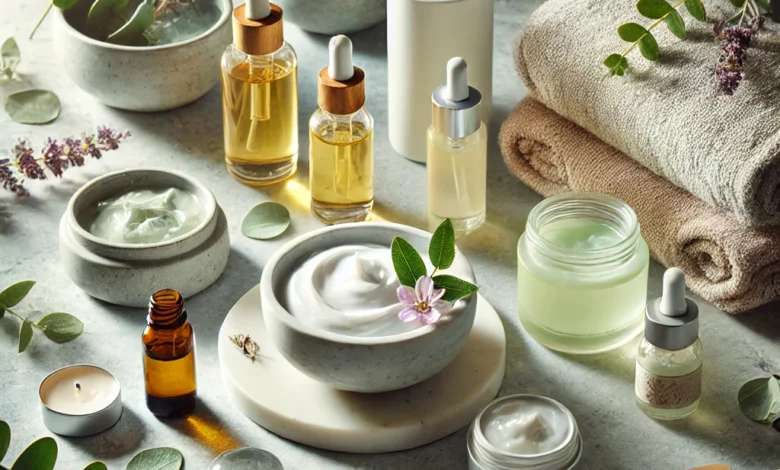Luxurious and Natural Skincare Setup: A Spa-like Atmosphere

1. Determine Your Skin Type
The first step to proper skincare is correctly identifying your skin type. Skin types generally fall into five categories:
- Normal Skin: Balanced skin that is neither too oily nor too dry.
- Dry Skin: Skin that needs moisture and often appears flaky and dull.
- Oily Skin: Skin that produces excess sebum, usually with a shiny appearance, and is prone to acne.
- Combination Skin: The T-zone (forehead, nose, and chin) is oily, while other areas may be dry or normal.
- Sensitive Skin: Skin that is easily irritated, prone to redness, and allergic reactions.
Suggestion:
To determine your skin type, wash your face and wait for an hour before checking your skin in a mirror. Do you notice oiliness or dry patches?
2. Cleansing: Clean Skin is Healthy Skin
Cleansing is the most important step for all skin types. Dirt, oil, and makeup residues accumulate on the skin throughout the day, clogging pores and leading to acne and blackheads.
- For Normal and Combination Skin: Use mild cleansers. Foaming face washes are ideal for these skin types.
- For Oily Skin: Cleansers with salicylic acid help control oil and deeply cleanse pores.
- For Dry and Sensitive Skin: Moisturizing and gentle cleansers should be used, preferably formulas that don’t irritate the skin.
Tip:
Cleanse your face every morning and night with a suitable cleanser. You can also exfoliate once a week to remove dead skin cells.
3. Moisturizing: The Lifeblood of Your Skin
Regardless of your skin type, moisturizing is a must. Moisturizers help maintain the skin’s moisture balance and strengthen it against external factors.
- For Oily Skin: Water-based, lightweight moisturizers are ideal.
- For Dry Skin: Opt for oil-based creams that provide deep hydration.
- For Sensitive Skin: Hypoallergenic moisturizers without perfume, alcohol, or other irritants are ideal.
Suggestion:
Always apply moisturizer to clean skin. Use lighter moisturizers in summer and heavier ones in winter.
4. Sunscreen: The Secret to Anti-Aging
The harmful UV rays of the sun can damage our skin, leading to premature aging, spots, and even skin cancer. Using sunscreen every day, all year round, is the best way to prevent these effects.
- For Oily Skin: Use water-based, mattifying sunscreens.
- For Dry Skin: Sunscreens that also provide hydration are preferred.
Tip:
Choose sunscreens with at least SPF 30 and apply them 20 minutes before going outside.
5. Serums and Active Ingredients: Effective Solutions for Skin Problems
Serums have concentrated formulas targeting specific skin problems. Anti-aging, spot-reducing, or acne-fighting serums address different needs.
- Hyaluronic Acid: Adds moisture to the skin, ideal for dry and dehydrated skin.
- Retinol: A powerful anti-aging ingredient that helps with fine lines and wrinkles.
- Vitamin C: Helps even out skin tone and reduce the appearance of spots.
Suggestion:
Apply serums to clean, toned skin. If using retinol, add it to your nighttime routine and always follow with sunscreen.
6. Establish a Regular Skincare Routine
Skincare is not a quick fix. You can achieve healthy skin by using the right products regularly. Once you establish a routine suitable for your skin type, apply it twice a day—morning and night.
Suggestion:
Regularly update your products according to your skin type and the season. Also, pamper your skin with a mask once a week.
7. Brightening Products to Even Skin Tone
Over time, sunspots, acne scars, or dark spots from aging can develop on the skin. Skin-brightening products and serums can help reduce these spots.
- Niacinamide: Helps even skin tone and reduce spots.
- Arbutin: A natural brightener known for reducing dark spots.
- Vitamin C: Known for its antioxidant properties, it helps protect the skin from free radicals and targets pigmentation issues.
Suggestion:
Incorporate such products into your nighttime routine, and don’t forget to use sunscreen during the day to protect your skin.
8. Mask Usage According to Skin Type
Masks can be an essential part of your weekly skincare routine, but each skin type requires different types of masks.
- Clay Masks (For Oily and Combination Skin): Absorb excess oil and cleanse pores.
- Hydrating Masks (For Dry and Sensitive Skin): Provide intense moisture with ingredients like hyaluronic acid or aloe vera.
- Detox Masks (For All Skin Types): Help remove toxins and give your skin a glow.
Suggestion:
Use masks 1-2 times a week based on your skin’s needs. For sensitive skin, avoid leaving masks on too long.
9. Night Care: Time for Skin Renewal
At night, your skin repairs and renews itself, so nighttime skincare products are often more intense and restorative than daytime products.
- Night Creams: Anti-aging or deeply moisturizing night creams work while you sleep.
- Night Serums: Serums containing retinol or peptides help with skin renewal and firming.
- Eye Creams: Since the skin around the eyes is delicate, using repairing eye creams at night can reduce fine lines and puffiness.
Suggestion:
Create a consistent nighttime routine and apply products to clean skin before bed. Also, change your pillowcase regularly to keep your skin clean.
10. Exfoliation: Get Rid of Dead Skin
Dead skin cells accumulate on the skin’s surface, making it look dull and lifeless. Regular exfoliation or peeling once a week can rejuvenate your skin.
- Chemical Peels: AHA and BHA peels exfoliate the skin chemically, even out skin tone, and clean pores.
- Physical Peels: Scrubs with fine particles gently remove dead skin, but be careful not to rub too hard on sensitive skin.
Tip:
Choose an exfoliant that suits your skin and use it 1-2 times a week. Apply chemical peels at night, and always use sunscreen during the day.
11. Anti-Aging Products: Fight the Signs of Time
As we age, our skin develops fine lines, wrinkles, and loses elasticity. Anti-aging products can help combat these signs.
- Retinol: One of the most effective ingredients for anti-aging, it speeds up cell renewal and reduces fine lines.
- Peptides: Promote elasticity and firmness in the skin.
Tip:
Start using anti-aging products early for long-term benefits. Apply retinol serums in your nighttime routine.
12. Natural Oils and At-Home Skincare
Natural oils have become popular in recent years. You can use oils that suit your skin type to provide additional care for your skin.
- Jojoba Oil: Balances oil production, ideal for oily skin.
- Argan Oil: Perfect for dry or aging skin, providing hydration and elasticity.
- Lavender Oil: Soothes sensitive or irritated skin and is useful for acne treatment.
Suggestion:
Incorporate natural oils into your skincare routine and massage them into the skin for better absorption.
13. General Skincare Tips
- Drink Plenty of Water: Staying hydrated is essential for skin moisture and toxin removal. Aim to drink at least 8 glasses of water a day.
- Watch Your Diet: Foods rich in Omega-3, antioxidants, and vitamins directly impact skin health.
- Avoid Stress: Stress can trigger breakouts and other skin issues. Try relaxation techniques like meditation or yoga.
- Get Enough Sleep: Your skin renews itself during sleep, so aim for 7-8 hours of sleep every night.
14. Managing Redness and Rosacea
Redness and rosacea are common skin concerns, particularly for sensitive skin. Rosacea can cause visible redness and enlarged blood vessels.
- Use Gentle Products: Choose fragrance-free, hypoallergenic products for rosacea. Products with soothing ingredients like aloe vera, chamomile, and green tea help calm the skin.
- Sun Protection is a Must: Sun exposure can trigger rosacea. Always use SPF 30 or higher.
Suggestion:
For rosacea and sensitive skin, use specialized creams and serums recommended by a dermatologist. Avoid spicy foods and hot drinks, as they can worsen the condition.
15. Eye Care: Wrinkles and Dark Circles
The skin around the eyes is the most delicate part of the face. Over time, wrinkles, crow’s feet, and dark circles can form.
- Caffeine Eye Creams: Help reduce puffiness and under-eye bags.
- Retinol Eye Creams: Help reduce fine lines and should be applied at night.
- Hyaluronic Acid and Peptides: Help tighten and moisturize the skin around the eyes.
Tip:
Since the skin around the eyes is thin and delicate, gently apply your eye cream. Use your fingertips to massage the product into the skin lightly.
16. The Effect of Hormonal Changes on Skin
Hormonal changes, especially during puberty, pregnancy, or menopause, can significantly affect the skin. During these times, the skin may become more oily, prone to acne, or dry.
Anti-Acne Products: Salicylic acid and zinc-containing products are recommended for treating hormonal akne, especially during puberty or menstruation.
Pregnancy Skincare: During pregnancy, the skin may become more sensitive. It’s essential to avoid strong ingredients like chemical peels and retinol and opt for gentle and natural products instead.
Suggestion:
To manage the effects of hormonal changes on your skin, maintain a balanced diet, stay hydrated, and manage stress. Consult a dermatologist for products that are compatible with your hormonal balance.
17. Lip Care: Moisturizing and Protective Products
When it comes to skincare, lips are often overlooked. However, lips need regular care and protection too.
- Lip Balms: Use balm-based moisturizers to keep your lips from drying out, especially during winter when they are more prone to chapping.
- SPF for Lips: The sun can damage your lips just like it does your skin. Protect your lips with lip balms that contain SPF.
- Peeling: Exfoliate the dead skin on your lips with a gentle lip scrub once a week.
Tip:
For intense hydration, apply lip balm before going to bed. You can also use natural exfoliants like honey or sugar for gentle lip scrubs.
18. Dealing with Acne and Acne Scars
Acne is a common skin problem that many people face at some point in their lives. However, getting rid of acne doesn’t always end the problem, as it may leave scars behind.
- Salicylic Acid and Benzoyl Peroxide: These ingredients are highly effective in treating acne by cleansing the skin deeply and preventing new breakouts.
- Brightening Serums: Serums containing niacinamide and Vitamin C can help fade acne scars and hyperpigmentation.
- Chemical Peels: Chemical peels remove dead skin cells, help renew the skin, and reduce the appearance of acne scars.
Suggestion:
Avoid picking or squeezing pimples, as this can increase scarring. Instead, use products recommended by your dermatologist to treat the acne and prevent further damage.
19. Anti-Aging Skincare Routines
As we age, our skin’s collagen production decreases, leading to fine lines, wrinkles, and sagging. Establishing an anti-aging routine helps maintain firm and youthful-looking skin.
- Collagen Supplements: In addition to skincare products, collagen supplements can help boost collagen production in your skin.
- Antioxidant Care: Use products rich in antioxidants like Vitamin C or green tea to protect your skin from damage caused by free radicals.
- Facial Massage and Exercises: Facial massages and exercises can be included in your skincare routine to improve the skin’s elasticity and maintain its firmness.
Tip:
In addition to anti-aging products, maintaining a healthy lifestyle with regular sleep, a balanced diet, and proper hydration will help your skin stay young and healthy.
20. Exercise and Skin Health
Exercise not only benefits your overall health but also positively impacts your skin. Increased blood circulation during exercise delivers more oxygen to the skin and speeds up cell renewal.
Post-Workout Skincare: After exercising, make sure to cleanse your skin with a gentle cleanser and apply moisturizer to maintain hydration.
Benefits of Sweating: Sweating helps open your pores and cleanses the skin. However, it’s important to wash your face after sweating to avoid breakouts.







